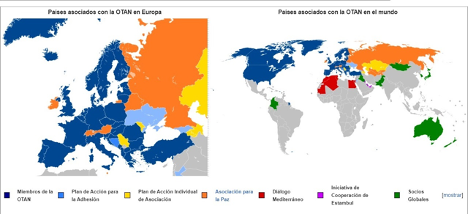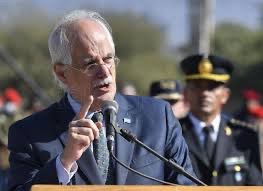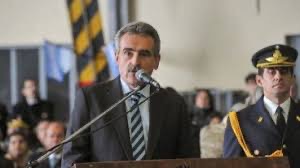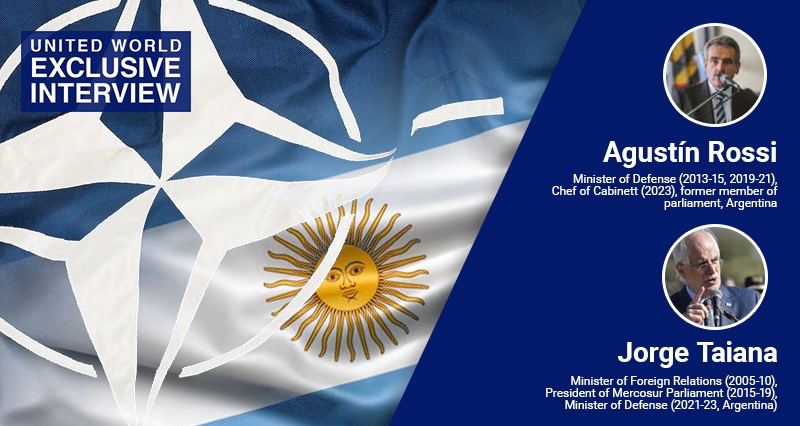By Úrsula Asta, Buenos Aires, Argentina
Argentina, a member of NATO?
These days, at the local level, Argentina exhibits some of the obscenest images. The president says, in a business forum held in the south, that those who hide money are heroes who have escaped the clutches of the State. Meanwhile, in terms of international relations, the country shows a kind of honeymoon with the West.
Among other elements, the Argentine Javier Milei has already marked his alignment with Israel amid an escalation in the Middle East. But, the recounting of some events in recent weeks crowns a well-marked line of action of subordination: the General and head of the United States Southern Command Laura Richardson visited the province of Tierra del Fuego, Antarctica and the South Atlantic Islands; the CIA chief William Burns also paid a visit; the Argentine Security Minister Patricia Bullrich made a trip to North America to the FBI facilities; a contract was signed to acquire 24 used American F-16 fighter aircraft from Denmark; the American anthem was broadcasted on the Argentine national network; a “crisis committee” was created following Iran’s attack on Israel; the words of the Israeli ambassador were distributed to Argentine society through a press conference.
In this context, Milei requested Argentina’s entry into the North Atlantic Treaty Organization (NATO). This was communicated by the Minister of Defense, Luis Petri, who presented a letter requesting the incorporation as a “global partner” and met at the headquarters of that organization in Brussels, Belgium, with NATO’s Deputy Secretary General, Mircea Geoana.
“We will continue working to recover links that allow us to modernize and train our forces to NATO standards,” Petri said after the meeting. Furthermore, according to the Argentine government, they seek to “strengthen the link with NATO for the development of peace operations,” and “strengthen control of the maritime sphere and improve cyber capabilities.”
For his part, Geoana said that “it is a great pleasure to welcome Defense Minister Petri to NATO headquarters” and assured that “Argentina plays an important role in Latin America.”
During his stay in Brussels, the Minister of Defense also met with Javier Colomina Piriz, NATO’s Deputy Secretary General for Public Affairs and Security Policy, to whom he presented Argentina’s proposals to “explore issues of mutual interest such as maritime security and strengthening the strategic security dialogue.”
NATO: Periods and alliances
NATO is an organization that was born in 1949, at the end of the Second World War. Its 12 founders, with the United States at the head, were prepared to “protect” each other through “Article 5”, which established that in the event of an attack on any of the nations that made up the organization, all of them would unify to repel the enemy.
This organization, which is governed by the North Atlantic Treaty or Washington Treaty, signed on April 4, 1949, then constitutes a collective defense system. However, as the other side of this postulate, it could be said that in the last quarter of a century, they have used their military power to go against some states, such as Afghanistan (2001) and Libya (2011), as well as joining the forces of their alliance. in which were the bombings on Yugoslavia (1999).
Amid the Cold War, the development and expansion of communism, with the Soviet Union (USSR), was a threat to this bloc. The bipolar confrontation inhabits the context of a period of time that NATO itself places between 1949 and 1991. After the fall of the Berlin Wall, the scope and relationship with other countries was reoriented, welcoming new members even outside the previously region. covered. Then, after September 11, 2001, NATO invokes Article 5 for the first and only time. The United States does so, getting members to collaborate in the war in Afghanistan.
In each of these periods, new countries joined the transatlantic organization and today there are 32. At the same time, NATO generated agreements with other non-member countries of the Alliance and associations in other regions, such as the Partnership for Peace, the Mediterranean Dialogue, or the Istanbul Cooperation Initiative. The “global partner” category is held by 15 countries, including Colombia, the only Latin American country, as well as Afghanistan, Australia, Iraq, Japan, South Korea, Mongolia, New Zealand, and Pakistan.
Being a global partner of NATO does not mean being a member of the organization, but it is supposed to have “cooperation privileges” from the member countries of the alliance concerning equipment, training and research towards the countries that make up this group such as if they were members.
Agreements with other countries that are not members of the Alliance

A global alliance to replace the United Nations?
Jorge Taiana was Minister of Defense of the Nation between 2021 and 2023 during the presidency of Alberto Fernández. Among other positions, he has held that of senator (2019-2021), president of the Mercosur Parliament (2015-2019) and minister of Foreign Affairs, International Trade and Worship (2005-2010).
When consulted by UWI, the former official reviewed that “NATO is an organization that was basically created in the Cold War and that incorporates states from Europe, plus the United States and Canada” and that “it has had a very important role, after being inactive with the disappearance of the Soviet Union, recently in the confrontation between Ukraine and Russia, obviously supporting Ukraine.”

In addition to this current situation, he added that “what the United States is proposing, and is putting into practice by making agreements with different countries, is the idea that NATO should not limit itself to the conflict over Europe or the former Soviet Union, that is, Russia, but rather, it must be a force to represent a global alliance with different countries and have the capacity for training, action and operations in different parts of the world.”
For this reason, Taiana continued, “it has been creating this idea of global NATO, which in some way replaces the United Nations system of peace operations and conflict resolution, including the use of force, which is what establishes Article 7 of the United Nations Charter.”
“Faced with this situation, which the United States tends to see as paralyzed, it is simultaneously creating an alliance, with variable geometry, with different states. That is what Argentina has proposed for its entry, that is, it is a commitment to subordination to the strategy of the United States and to participate or cooperate, in some way, in the different conflicts that an international power like the United States commits to,” he added.
Automatic alignment, foreign conflicts… and the Malvinas Islands?
The former Minister of Defense and former Argentine Foreign Minister Taiana assessed that Argentina’s eventual entry as a global partner of NATO is a strategic error and that it means moving away from a tradition of non-alignment.
“From the Argentine point of view, it is a strategic error. Argentina not only does not have to subordinate itself to the United States and be part of its various conflicts as a semi-colony. Furthermore, it cannot participate in an organization that has the United Kingdom as a very active member, a power within NATO, that has occupied part of the Argentine territory since 1833 in the Malvinas Islands, South Georgia and the South Sandwich and the surrounding maritime spaces,” he said.
“Therefore,” he stressed, “it is a strategic error, and it also departs from the tradition of neutrality, of non-alignment of Argentina, of non-interference in the internal affairs of the countries, of peaceful resolution of controversies and of not generating military spaces outside the United Nations system. Argentina has always been very respectful of international law and the role of the United Nations. What is being done now is to abandon that framework and create a space that actually, rather than representing the interests of everyone, basically represents the interests of the United States and Western Europe.”
Agustín Rossi was Argentine Minister of Defense between 2013-2015, during the presidency of Cristina Kirchner and between 2019-2021, with Alberto Fernández, in addition to being a deputy (2005-2013 and 2017-2019) and head of the Cabinet of Ministers in 2023, among other positions. For him, being a global partner of NATO implies a contradiction and an automatic alignment with the United States.
“Being a global partner of NATO implies a contradiction with respect to the sovereignty that we claim in the Malvinas, because it would mean associating with those who intruded and occupied a piece of our territory. In other words, implicitly, it would mean a surrender of our sovereign claim over the Malvinas,” he stressed.

In dialogue with UWI, he added that “secondly, it is assuming all the war conflicts in which NATO could participate as our own, not having the possibility of deciding on them, but simply abiding by the decisions that are made within the framework” of that transatlantic organization.
“And the third element that I think is important to consider – he added – is that all this is done within the framework of a policy of automatic alignment of President Milei with the United States. And that policy of automatic alignment means assuming the foreign policy of the United States as one’s own, regardless of whether or not that foreign policy of the United States benefits the Argentine people.”
Problems of yesterday and today
In another historical moment, Argentina sought to enter the North Atlantic military alliance. It was in 1999, at the end of Carlos Menem’s government, but NATO rejected it. The previous year, 1998, Argentina had been designated by the United States as an important extra-NATO Ally, which is a lower status than what was sought then and what is sought now, and which meant a bilateral agreement between Argentina and the United States. and not with the rest of its members.
The transatlantic organization, after the meeting with Minister Petri, evidences in the statement issued that “NATO’s political dialogue with Argentina began in the 1990s. “Buenos Aires later contributed to NATO peace support operations in Bosnia and Herzegovina, and in Kosovo. Colombia is currently the only NATO partner country in Latin America. Any decision on a formal association would require the consensus of the 32,” the text states.
The allusion to these operations is interesting, because they were legally questioned attacks and conceived as violating international law.
In terms of foreign policy, Argentina shows an extreme orientation. It remains to wonder what the forces and mechanisms are within the country and the region to avoid this to become a fact.
Argentina is located in a strategic geopolitical zone: the South Atlantic. While the world witnesses the formation of a multipolar order, linked, among other elements, to the strengthening and expansion of the BRICS, which implies a true counterweight to the hegemony of the United States and its Western allies in international relations, Argentina decides to leave that group of countries.,
By trying to become a “global partner” of NATO, however, it would get involved in the defense of possible “global threats” that do not serve the interests of its own people.

















Leave a Reply